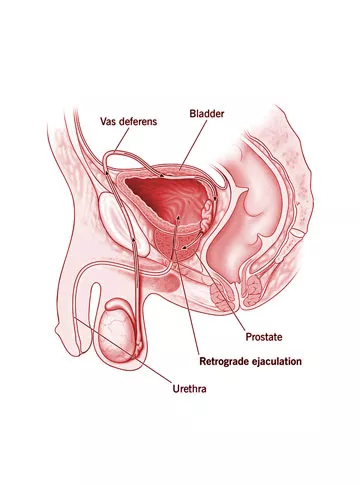What is Retrograde Ejaculation?
Retrograde ejaculation is a condition in which semen, containing sperm, does not exit the penis during ejaculation as it normally would. Instead, it travels backward into the bladder. This occurs because the bladder's sphincter muscle doesn't function properly during ejaculation, allowing semen to move in the wrong direction.
Who can get Retrograde Ejaculation?
Retrograde ejaculation can affect both men and women, but it primarily impacts males. It's most common in men with certain medical conditions or those who have undergone specific surgeries affecting the prostate, bladder, or urethra.
What are the Types of Retrograde Ejaculation?
The two main types of retrograde ejaculation are:
1.Complete retrograde ejaculation: In this type, all semen is directed into the bladder during ejaculation, and none is expelled from the penis.
2.Partial retrograde ejaculation: Some semen exits the penis during ejaculation, but a significant portion is redirected into the bladder.
What are the Causes of Retrograde Ejaculation?
Several factors can lead to retrograde ejaculation, including:
- Medical conditions: Diabetes, multiple sclerosis, spinal cord injuries, and certain medications can cause nerve damage that affects the muscles controlling ejaculation.
- Prostate or bladder surgeries: Procedures that affect the prostate, bladder, or urethra can sometimes damage the muscles or nerves responsible for controlling the bladder neck, leading to retrograde ejaculation.
- Medications: Certain medications, such as those used to treat high blood pressure, may cause retrograde ejaculation as a side effect.
What are the Symptoms of Retrograde Ejaculation?
The absence of semen during ejaculation is one of the main symptoms of Retrograde Ejaculation. Other symptoms may include:
- Cloudy urine: After ejaculation, the urine may appear cloudy due to the presence of semen.
- Infertility: Retrograde ejaculation can cause fertility issues because sperm is not being ejaculated out of the body.
- Reduced sexual sensation: Some individuals may experience a decrease in the intensity of orgasm due to the absence of ejaculate.
How does Retrograde Ejaculation affect Male Fertility?
Retrograde Ejaculation involves the backward flow of semen into the bladder instead of its normal exit through the urethra during ejaculation. While it may not pose a major health risk, it significantly impacts male fertility. Since semen, including sperm, is redirected away from the typical ejaculatory route, fertility is compromised.
How is Retrograde Ejaculation Diagnosed?
Diagnosing retrograde ejaculation typically involves a combination of medical history assessment, physical examination, and laboratory tests. Tests may include a urine analysis after ejaculation to detect the presence of sperm in the urine, urodynamic studies, and assessment of bladder function.
How is Retrograde Ejaculation Treated?
The line of treatment will differ depending on the underlying cause of problem. Treatment options may include:
- Medication adjustment: If retrograde ejaculation is caused by certain medications, adjusting or discontinuing them may help alleviate the condition.
- Treating underlying medical conditions: Managing conditions like diabetes or multiple sclerosis can sometimes improve retrograde ejaculation.
- Fertility treatments: If fertility is a concern, assisted reproductive techniques such as intrauterine insemination (IUI) or in vitro fertilization (IVF) may be considered.
Conclusion
Retrograde ejaculation is a medical condition that can affect the fertility and sexual experience of individuals. Understanding its causes, symptoms, and available treatments is crucial in managing and addressing this condition effectively. If you suspect you may be experiencing retrograde ejaculation, seeking medical advice and appropriate treatment is essential.
Pregnancy Calculator Tools for Confident and Stress-Free Pregnancy Planning
Get quick understanding of your fertility cycle and accordingly make a schedule to track it















